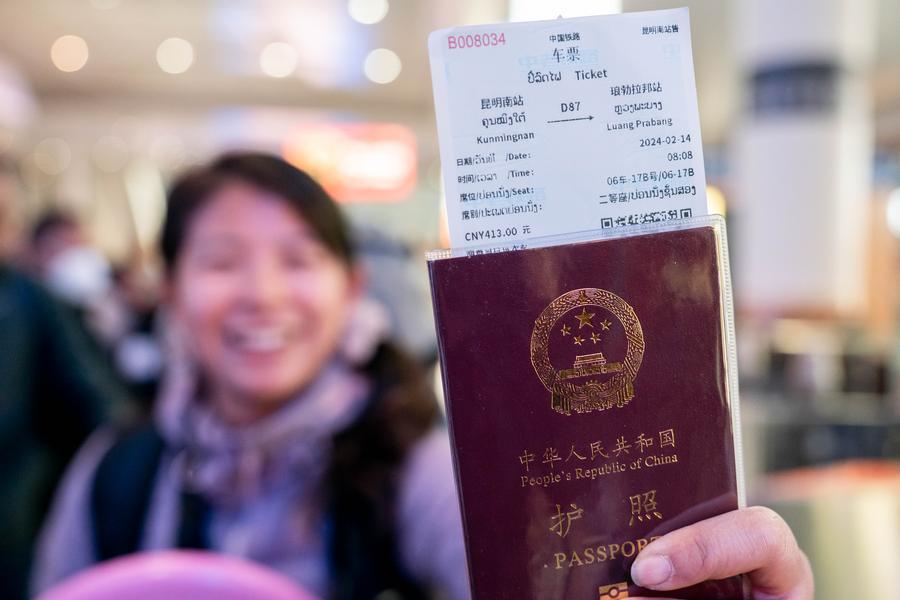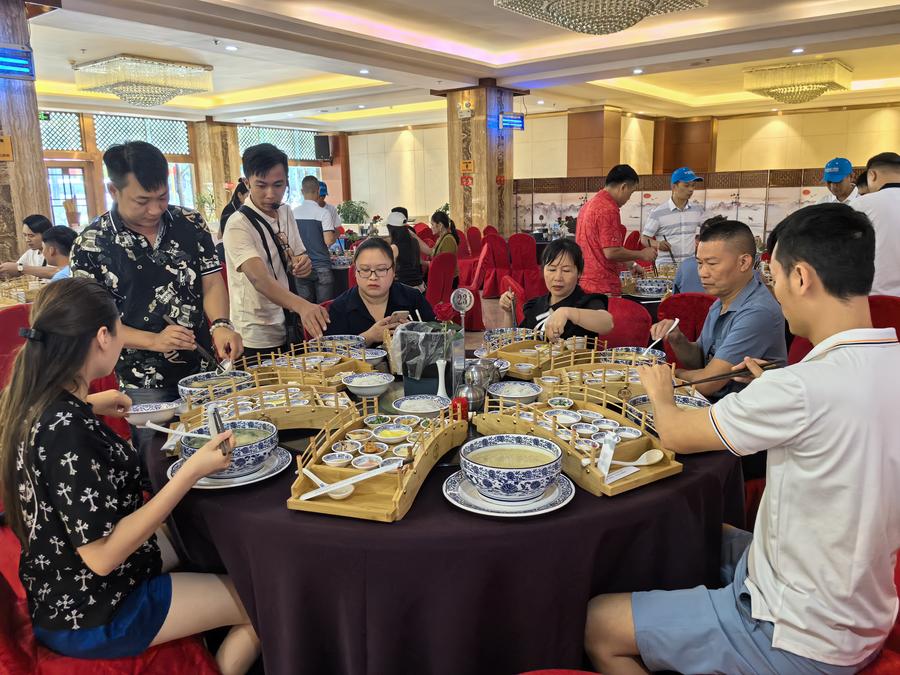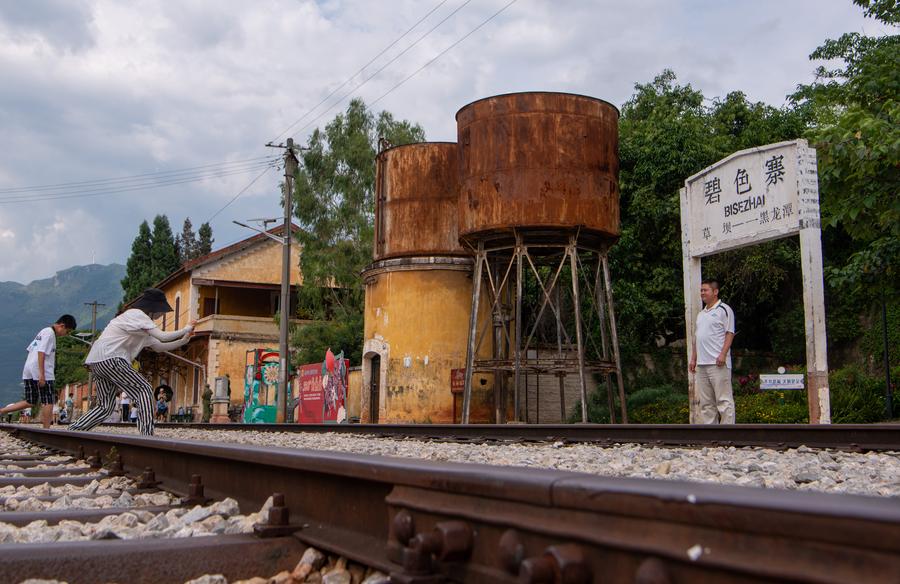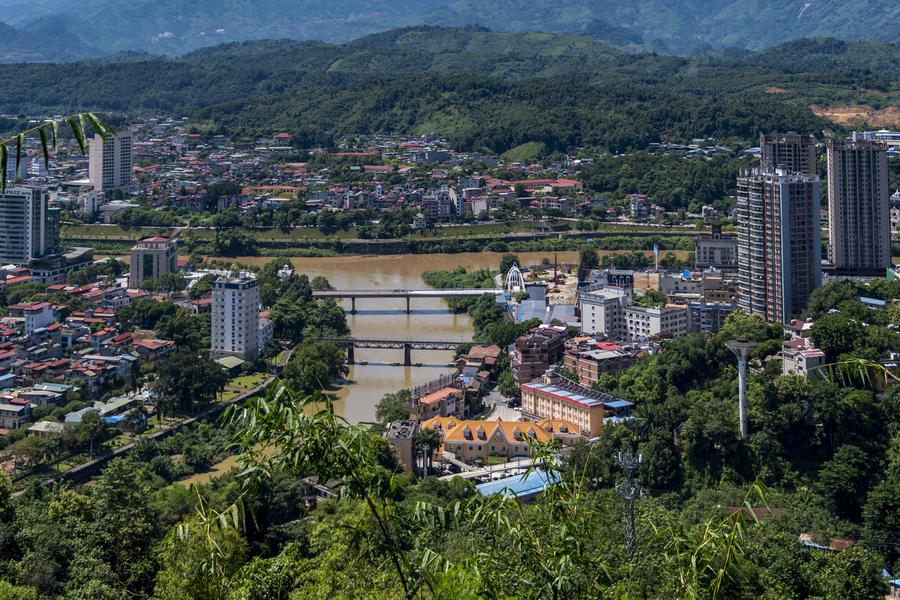* "China travel," a prominent buzzword on social media platforms recently, reflects a notable surge in the country's cross-border tourism.
* The influx of Vietnamese tourists in Yunnan Province and Guangxi Zhuang Autonomous Region significantly contributes to this trend.
* Considerable confidence in the cross-border tourism sector is fueled by China's marked improvements in tourism infrastructure and supportive amenities now in place.
KUNMING/NANNING/HANOI, June 11 (Xinhua) -- "China travel" has recently emerged as a prominent buzzword on social media platforms like YouTube, reflecting a notable surge in the country's cross-border tourism. A rising wave of international tourists is discovering the real China.
The influx of Vietnamese tourists in Yunnan Province and Guangxi Zhuang Autonomous Region, where the major China-Vietnam border ports are located, significantly contributes to this trend. Meanwhile, Vietnam is gaining popularity as a travel destination for Chinese tourists, driven by their similar cultures and an increasingly strong bilateral relationship.

A passenger shows her passport and a train ticket to Luang Prabang of the Laos via the China-Laos Railway, in Kunming, southwest China's Yunnan Province, Feb. 14, 2024. (Xinhua/Hu Chao)
The Tourism Information Technology Center of Vietnam National Authority of Tourism highlights China as a key driver for Vietnam's tourism growth, with a remarkable 112,000 arrivals in April alone, which topped the growth rate among Vietnam's international tourist markets.
As the bilateral cooperative partnership deepens and mutual exchanges flourish, tourism professionals and experts from both sides express considerable confidence in the cross-border tourism sector. This optimism is fueled by the marked improvements in tourism infrastructure and supportive amenities now in place.

A group of Vietnamese tourists taste local rice noodles in Mengzi City, southwest China's Yunnan Province, May 24, 2024. (Xinhua)
ONE-DAY TOUR
In recent years, one-day tours to border prefectures such as Honghe Hani and Yi Autonomous Prefecture, and Wenshan Zhuang and Miao Autonomous Prefecture in Yunnan, as well as Dongxing City and Pingxiang City in Guangxi, have gained significant popularity among Vietnamese tourists.
These tours offer engaging activities like supermarket shopping, savoring local delicacies, and enjoying leisurely coffee moments, catering to Vietnamese visitors eager to immerse themselves in Chinese customs.
Vuong Van Thanh, a seasoned tour guide from Vietnam, has been leading groups across the Beilunhe Bridge, linking Mong Cai in Vietnam with Dongxing in China, for enriching one-day tours.
He notes a marked increase in tour bookings this year. "Our guests have a fondness for Chinese cuisine, with many returning for the renowned chicken soup," he said. Beyond the culinary attractions, Vietnamese tourists relish the diverse shopping experiences, including the purchase of household appliances and fashionable clothing.
A recent group of 28 Vietnamese tourists seeking the famed flavors of Chinese cuisine embarked on a gastronomic journey to Mengzi City in Honghe, where they were captivated by the enticing tastes of local rice noodles. Kieu Deng Truong, visiting from Hai Duong province, was particularly impressed by the soup's rich flavor, despite his hometown's reputation for exceptional rice noodles. His experience has inspired plans to introduce family and friends to this delectable Chinese dish.
The Culture and Tourism Bureau of Honghe Prefecture reports that from January 1 to May 19, the region's travel agencies welcomed 4,550 inbound groups comprising 61,380 tourists, a testament to the boom in cross-border tourism.
Concurrently, the trend of outbound travel by Chinese tourists is gaining momentum, with Vietnam emerging as one of the top-tier destinations during the May Day holiday, as reported by Ctrip, a leading Chinese travel platform.
Chong Yuanjian, a Chinese traveler, recently returned from a trip to Vietnam's Lao Cai Province, where he discovered the charm of authentic Vietnamese cuisine. "I find that Vietnamese food is different from ours. They cook in a lighter way, and I feel it's good for health."
This growing interest in cross-cultural experiences has invigorated Vietnamese tourism, with the General Statistics Office of Vietnam reporting a substantial year-on-year increase in international tourist arrivals.
The number of Chinese tourists to Vietnam has reached 1.25 million in the first four months this year, ranking the second among countries, said the department.

A tourist poses for photos at Bisezhai railway station in Mengzi City, southwest China's Yunnan Province, Aug. 9, 2022. (Xinhua/Jiang Wenyao)
TWO-WAY COOPERATION
The boom in tourism is significantly supported by convenient transportation networks. In Yunnan, Hekou Port is now accessible via both railway and expressway, with a new expressway to Tianbao Port in Wenshan Prefecture under development. This enhanced connectivity is a boon to the economy and offers new experiences to tourists from both countries.
Several kilometers away from Tianbao Port, a water-themed park is being built to meet the tourists' growing demands for high-quality tourism.
Guangxi's border city, Dongxing, celebrated the inauguration of its first railway last year, the Fangchenggang-Dongxing high-speed line. This line integrates Dongxing into China's extensive railway network.
"Thanks to the opening of the Fangchenggang-Dongxing high-speed railway, more and more Vietnamese tourists choose to start their travels from Dongxing Port and then go to other destinations by trains," said Wu Juan, deputy director of culture, radio, television, sports, and tourism bureau of Dongxing.

This photo taken on Sept. 10, 2021 shows railway (front) and expressway bridges linking Hekou Port (R) in Hekou County, southwest China's Yunnan Province and north Vietnam's Lao Cai Province. (Xinhua/Chen Xinbo)
The China-Vietnam Detian Waterfall cross-border tourism cooperation zone, operational since September 15, 2023, in Chongzuo City, Guangxi, exemplifies successful bilateral collaboration and attracts a rising number of tourists. As Asia's largest transnational waterfall, it offers a picturesque landscape and a vibrant ethnic culture, providing an immersive experience on the China-Vietnam-style street with minimal language or payment barriers.
"The cross-border formalities are very convenient, and the scenic area in China offers perfect tourism service facilities," said Vietnamese tourist Nguyen Thi Trang, who just finished a "one-day tour in two countries" travel in Guangxi's Chongzuo.
"Exploring ways of cross-border tourism cooperation in border areas not only contributes to the development of the economy but also sets an innovative example for China's tourism," said Dai Bin, president of the China Tourism Academy.
(Video reporters: Zeng Wei, Xiong Xuan'ang; Video editors: Zheng Xin, Zhang Yuhong)




 A single purchase
A single purchase









